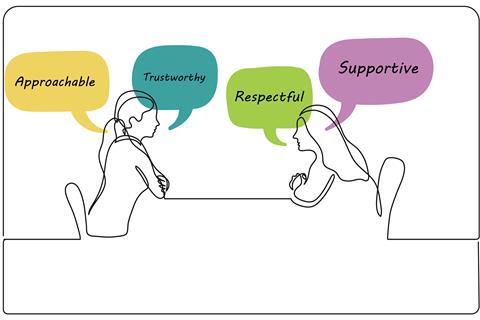Develop and maintain supportive relationships with colleagues and pupils from day one with this advice
After starting off as mentor and mentee, chemistry teachers Laura and Hayley are now firm friends. And they’re giving us a window onto their friendship. So let’s eavesdrop as they talk about building and maintaining friendships at school.
LAURA SCOULAR: When school restarts it’s really nice to see everyone again. You always forget how much you miss your colleagues over the holidays.
HAYLEY RUSSELL: I know what you mean. It’s good that some of us met up a few times over the holidays. It’s also helpful having teacher friends in other schools. They are always there if you need to relieve some stress after a hard day.

LAURA: It makes it easier to talk about things because they can give unbiased advice. It means you don’t take work worries home with you.
HAYLEY: Exactly. Not all non-teaching friends and family understand just how stressful teaching can be. I’m lucky to have formed great relationships with my new department too.
LAURA: It’s hard to start building relationships. I think the easiest relationships to establish are definitely those in your department. It’s hard not to when you’re working together all day every day.
HAYLEY: I agree. It’s daunting being the newbie, but it gave me confidence making friends initially with the other new staff, both in my probation year and in my new school. It means you have someone to bounce ideas off from day one.
LAURA: It makes so many day-to-day tasks that little bit easier. If you need a second opinion on a lesson or activity, it’s always easier being observed by someone you are comfortable around.
HAYLEY: And it’s much easier to give constructive feedback to someone you have a good relationship with. I’m lucky because so far I have been surrounded by supportive people.
LAURA: Me too. I have formed a lot of positive relationships that have lasted decades.
HAYLEY: How did you start these?
LAURA: As we always say, it’s about being yourself. I like to socialise quite a lot. In the past we organised breakfasts once a month with other departments to allow people to speak to one another on a more informal basis.
HAYLEY: That sounds fun. We do ‘cake Friday’ where every Friday someone bakes or buys cakes, on a rota basis. I would encourage anyone to try something like this.
LAURA: Or the walking group that you were involved in during probation?
HAYLEY: Yeah, it was nice to give staff the opportunity during the school day to chat informally and get to know one another better.
Tips for building and maintaining positive relationships
- Introduce yourself (and be yourself!).
- Don’t be afraid to admit when you are wrong.
- Praise in public, reprimand in private.
- Make a point of finding a conversation point for people.
Getting past conflict
HAYLEY: I’ve never had to deal with conflict between colleagues, but this can happen and I guess it’s pretty normal.
LAURA: Yes, when you are working in large groups there are going to be differences of opinion but that does not mean you can’t work together to achieve a positive outcome.
HAYLEY: You’re right. You can differ in opinion but, at the end of the day, we all have the interest of the pupils at the forefront of everything we do. How would you handle any disagreements?
LAURA: Everyone must feel like their views are heard and respected. I think it is best to explain why you feel the way you do and not be afraid to admit when you are wrong. The best thing to do is try to find a compromise. Departmental group tasks become much more manageable if you repair the relationship.
HAYLEY: Yes, and this helps when sharing classes if you like to teach concepts slightly differently. Not only does it keep you organised but, if the pupils see you working well together, it encourages them to work together too.
Looking for more advice on resolving disagreements?
Try these articles:
- Curb colleague conflict: rsc.li/3SNPviE
- When colleagues disagree: rsc.li/3CmdxdB
HAYLEY: If pupils know you are approachable and supportive, it benefits their learning and is one of the best ways to raise attainment as they will come to you for help. Plus, if you know your pupils well, it’s easier to pick up on any changes in behaviour or attitude and check-in on them too.
LAURA: It also lets pupils know that you are an approachable person, and relationships with pupils are arguably the most important ones.
HAYLEY: You’re right. It’s not always sunshine and roses. Relationships can break down sometimes. If this does happen the best thing to do is try to de-escalate the situation.
LAURA: Classroom management benefits because you have the mutual respect between the teacher and pupils. This is not always the case though.
HAYLEY: Having respect makes it easier to start over and rebuild the relationship.
LAURA: Yes. It’s always best to admit if you are wrong and be the bigger person and apologise. If pupils know you are making an effort to rebuild their trust and getting to know them better as individuals, it makes it easier to have a restorative conversation with them.
There’s no harm asking others for advice with this if you are unsure on how to approach a situation.
Establishing relationships
HAYLEY: At the beginning of the year I always start with a few icebreakers. I ask my classes questions about them and get them to fill out a form that asks if there’s anything they’d like me to know about them (that they might not want to say in front of the class). Getting little snippets of their personalities allows for easier conversations throughout the term.
I always make an effort to smile and say hello, even to pupils I don’t know well. I do it with staff too. I always try to remember something about them. You often end up having something in common, or a mutual friend.
LAURA: I like this. I think it’s nice to have a non-school related conversation with pupils at the end of the period. If you know that, for example, they play rugby, ask them about it. I always make sure I talk to everyone I see in the corridors, even if I don’t teach them. A quick ‘hello, how are you?’ is very valuable.
Aside from teachers and pupils, I encourage all new staff to get to know the various pupil support departments, technicians, janitors, cleaners, SLT, office staff, campus police officer, active schools co-ordinator, home school partnership officer and any other colleagues from outside agencies that are involved with your school.
Teaching is a (big) small world – everyone knows everyone!
HAYLEY: I agree. They are vital to the success of your school. It literally is as simple as popping your head into their rooms to say hello and introduce yourself. It helps put a face to a name. You don’t always need a specific purpose to go and talk to people. With cleaners and janitors, don’t just thank them for their help in your department. Talk to them, ask them about their day etc.
Parents and carers are key in pupil progress too. It’s good to communicate well through reports and jotter comments and to get to know them as well as you can at parents’ night.
LAURA: Exactly. If I ever need to discuss a specific incident or pupil will a colleague, I always try to include some everyday conversation too to get to know them better.
It’s really nice when you have taught siblings because you have already established that relationship with the family.
HAYLEY: Teaching is a (big) small world – everyone knows everyone! There are so many people involved in a school community. We need to all support one another and look after each other’s well-being.
Ready for more?
Read the first instalment of Hayley and Laura’s conversation on the EiC website: rsc.li/3Mmk9gv
Tune into Hayley and Laura’s podcasts for tips on work-life balance and starting at a new school: spoti.fi/3PDsbCt
Early career conversations

Essential advice for your first years of teaching in the science classroom, from a recent probationary teacher and her mentor
- 1
- 2
- 3
 Currently
reading
Currently
reading
Forever friends
- 5
- 6
- 7




















No comments yet